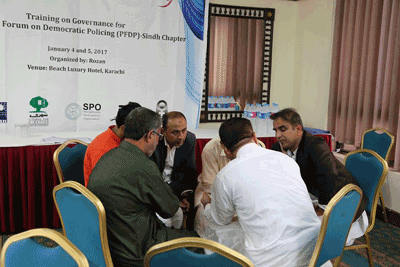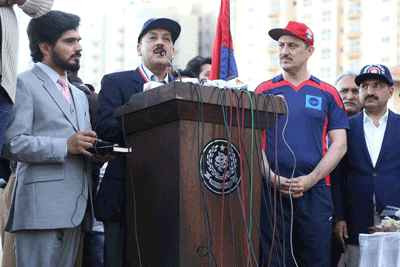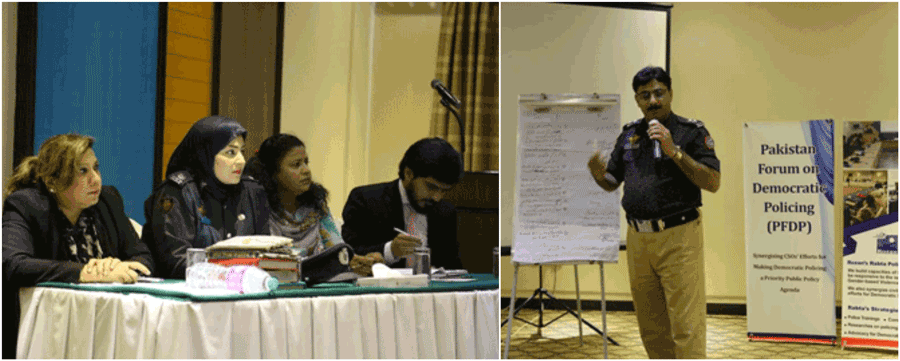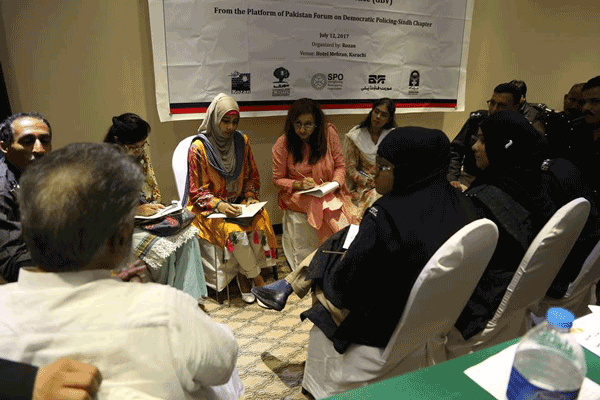Seeds of Police Reform
By Deneb Sumbul | Newsbeat National | Published 6 years ago
The Pakistan Penal Code was bequeathed to the subcontinent by the British Raj and was known as the Indian Penal Code prior to independence. Originally prepared by Lord Macaulay after considerable consultation, it came into effect in 1860, and was followed by the Police Act in 1861. Although subsequent governments have made amendments to it, most of the laws, rules and regulations remain, including those governing the country’s police force.
The police force in Pakistan is one of the most feared and least trusted of all government institutions. It has garnered a reputation for poor internal and external accountability, for corruption at the highest levels, for being the handmaiden of powerful politicians, feudals and assorted influential members of society, for its involvement in extrajudicial executions, the torture of detainees and harassment and extortion of individuals who seek to file criminal cases or even register a First Information Report (FIR).

Consultative meetings involving police reforms.
These issues became the ground for a civil society initiative for police reforms in Pakistan in 2011. Rozan, an Islamabad based non-profit, along with other like-minded civil society organisations such as Strengthening Participatory Organisation (SPO), Aurat Foundation, Shehri-CBE, and Centre for Peace and Development Initiatives (CPDI) became founding members of the Pakistan Forum for Democratic Policing (PFDP). Other organisations who joined the forum included the Human Rights Commission of Pakistan (HRCP), the Hamdard School of Law, Shirkat Gah, Khwendo Kor, HANDS, the Legal Rights Forum, and the Consumer Rights Commission of Pakistan, among others. Several of these non-profits had experts who had already been working on police reforms, but in pockets, until Rozan took the lead in bringing them under one umbrella. The foundation of the PFDP was laid in Islamabad – a national chapter that organised them into a network.
The PFDP’s core focus was to initiate a process among all key stakeholders to reform the police department so that it became an institution that was politically neutral, citizen-centric, accountable and gender sensitive. The forum aimed to examine the criminal justice system in Pakistan as a whole, identify the existing gaps and difficulties as well as provide technical support and lobby for revisions in the rules, procedures and by-laws that governed the police force.

Former IG Sindh A D Khawaja had proposed new rules for transfers, postings and tenures which are yet to be implemented.
The inclusion of more women in the police departments became one of the PFDP’s key demands. The national quota for women in the police force is 10 per cent, but presently the combined representation of women in the police force from all over the country is a mere 1.5 per cent.
Since its inception, the PFDP has held a series of consultancy meetings for a police reform bill in which former, as well as present senior police officers from the SSP to the IG level participated. Dr Muhammad Shoaib Suddle, former Inspector General Police and presently a Senior Fellow at NUST Global Think Tank Network, became one of PFDP’s consultants. Justice Nasir Aslam Zahid, a former Chief Justice of the Sindh High Court and a Supreme Court judge, was engaged to review the police rules and orders with a special focus on Gender-Based Violence (GBV). In collaboration with and under the supervision of Justice Zahid, PFDP drafted the Sindh Police Bill 2014. DIGP, South Zone, Sharjeel Kareem Kharal, made a major contribution to the effort, pointing out the pitfalls and shortcomings.
Senior women police officers such as the Superintendent of Police (SP), Shehla Qureshi and the SSP South, Suhai Aziz Talpur, were also part of the police reform draft bill consultations. They shared the difficulties and the mind-set women had to contend with in the thanas, and pointed out issues of infrastructure, attitudes, non-friendly environs, and even the lack of furniture and separate toilets. Their suggestions, along with the necessary mechanisms, were incorporated in the police reform bill to make the thanas, with their disconcerting culture, more conducive for women to work in, as well as approach. SP Shehla Qureshi recommended that women be given incentives to motivate them to join the police force.
The PFDP held a series of consultations with parliamentarians from all major political parties, including the PPP, the PML-N and the MQM. In 2016, after four years of extensive work covering all the possible challenges and hurdles, and taking on board all recommendations for changes and amendments from key stakeholders, a host of constitutional experts and researchers, the PFDP presented the comprehensive 76-page draft Sindh Police Bill, 2014 to the Government of Sindh and the National Assembly’s Standing Committee. The draft bill was subsequently amended, in 2016.
Five years on, the bill has neither been presented nor debated. Unfortunately, police reforms have never been a part of any political party’s agenda or manifesto. All they have done is provide lip service to it in the media. There has been total silence on the matter because in reality, no political party wants the police to be empowered. Whether it is the PPP or the PML-N, or other political parties, once they come to power, the first thing they do is establish control over the police force.
The PFDP decided to work first with the PPP government in Sindh for several reasons: it was the PPP that had passed the most women-centric legislation; it was already sensitised with regards to the gender-based violence (GBV); moreover, it held a majority in the Sindh Assembly. In a series of meetings and consultations the PFDP held with PPP senators, MNAs and spokespersons, the latter invariably responded positively, promising to table the bill in the Sindh Assembly.
The PFDP’s core focus was to initiate a process among all key stakeholders to reform the police department so that it became an institution that was politically neutral, citizen-centric, accountable and gender sensitive. The forum aimed to examine the criminal justice system in Pakistan as a whole.
The draft of the PFDP’s police reform bill handed over to the PPP was sent to the party’s secretariat in 2015 – but has not moved forward since. There came a point when PFDP representatives met with the Minister of Parliamentary Affairs, Dr Sikandar Ali Mandhro, at the secretariat to follow up on the progress of the bill. The minister’s response was that PPP’s legal experts were drafting their own police reform bill – having taken points from the PFDP’s – and planned to present it in the Sindh Assembly. But when asked to share their reform bill with the PFDP, they kept stalling.
The Sindh chapter of the PFDP was launched in Karachi in 2016, with 36 organisations from 14 districts of Sindh, including local CBOs such as Aurat Foundation, SPO, Shirkat Gah, Legal Rights Forum, PILER, War Against Rape (WAR). Representatives of the PFDP Sindh chapter followed up with the PPP on the police reform bill they had submitted. As on previous occasions, the response was that the PPP’s legal department was vetting the draft.
The core issue is that the police force is deeply politicised. The first priority of any political party after coming to power is the induction of their party workers in the police department. Their intervention extends to the level of the local thanas where they want to place their own people at the SHO, ASI, and even investigation officer level.
In September 2015, the Supreme Court ordered the federal and provincial ombudsmen to submit a report on “Good Administration Standards for Police Stations.” Accordingly, the Federal Ombudsman’s Secretariat constituted a committee headed by former federal secretary Abbas Khan, and IGP Khyber Pakhtunkhwa and Punjab provinces to deliberate upon the matter and submitted a detailed report by May 2016.
A D Khawaja assumed charge as Inspector General of Sindh Police in 2016, after his predecessor, Ghulam Hyder Jamali was removed. Jamali had conceded before a three-judge SC bench (in 12 March 2016), that out of the 12,000 appointments made in the Sindh Police, 5,000 appointments had been illegal. The court ordered the National Accountability Bureau (NAB) to investigate the bogus recruitments and the mismanagement of police funds.
One of the most laudable steps taken by A D Khawaja, as IG Sindh, was to try to de-politicise the police force and his resistance to political pressure became the root cause of the conflict between him and the Sindh government. The rift developed after he refused to appoint constables on the quota system and hired them through National Testing Services (NTS). He was also of the view that the institution should be an autonomous body and not under the control of the government – the crux of PFDP’s Sindh Police Bill 2014.
The core issue is that the police force is deeply politicised. In September 2015, the Supreme Court ordered the federal and provincial ombudsmen to submit a report on “Good Administration Standards for Police Stations.” Accordingly, the Federal Ombudsman’s Secretariat constituted a committee which deliberate upon the matter and submitted a detailed report in May 2016.
In compliance with the Sindh High Court judgement of September 7, 2017, A D Khawaja prepared and submitted a draft of the Sindh Police (Posting, Transfer and Tenure) Rules 2017 to the Chief Secretary of Sindh on October 5, 2017 for perusal and onward submission before the provincial cabinet. In a provincial cabinet meeting in October 28, 2017, held under the chairmanship of Sindh Chief Minister, Syed Murad Ali Shah, Khawaja gave a detailed presentation on the proposed Sindh Police (Posting, Transfer & Tenure) Rules 2017 in light of the Sindh High Court judgment. According to the proposal, the IG would have the transfer and posting powers of all police officers from Grade-1 to Grade-21 through an assessment board and they would have a proper tenure. In the same meeting, the cabinet decided to replace AD Khawaja with Sardar Muhammad Dasti as IGP Sindh.
In 2016-17, members of the civil society had filed Constitutional Petitions No. D-7097 of 2016, ‘Karamat Ali & Others versus Federation of Pakistan & Others’ and No. D-131 of 2017 for Police Reforms, ‘Shehri – Citizens for a Better Environment & Others versus Federation of Pakistan & Others’ – before the Sindh High Court in Karachi, seeking to de-politicise the police force by restraining the Sindh Government from subverting the autonomy and
independence of the Sindh Police. They also challenged the illegal removal of
A D Khawaja as IG of Sindh Police. In the case of both petitions, the Sindh High Court had announced its judgement in favour of A D Khawaja.
The Sindh Government decided to file an appeal with the Supreme Court and in violation of the judgement, the Sindh Government also decided to approach the Federal Government to remove A D Khawaja, rejecting the draft rules presented by him on The Sindh Police (Posting, Transfer & Tenure) Rules, 2017.
On the positive side, currently men and women graduating from police training centres in Karachi are recruited as Grade 17 officers of the Police Services of Pakistan (PSP), after they pass their examinations.

Left: Senior women police officials attend a seminar on the challenges in implementing pro-women laws. Right: A consultative workshop with the police.
When A D Khawaja served as IG Sindh, several ads were placed in newspapers encouraging women to join the police force. Unsurprisingly, hardly any women applied. For three consecutive years – 2016, 2017 and 2018 – the PFDP ran a campaign for – ‘The 16 days of Activism’ – an annual worldwide campaign to challenge violence against women and girls – to promote a soft image of the police among the communities. PFDP and CBO members would invite a cross-section of society to their activities, including local SSPs, donor representatives, media persons, minorities, local representatives and the youth.
The PFDP is now lobbying to implement the Sindh Police notification of November 26, 2009 to establish a Human Rights Cell in every District Police Office (DPO). A D Khawaja had issued a notification in 2012 to implement a notification first issued by the previous IG Sindh. Human Rights (HR) cells in every District Police Office that would ensure specialised handling of cases in four categories: human rights violation, violence against women, bonded labour and children’s rights. An amount of Rs 150,000 was to be allocated for each HR cell by the Central Police Office, along with one vehicle. Suitable accommodation with a dedicated staff was to be provided in each District Police Office.
The function of each HR cell would be to establish a special helpline for women; collect, collate, analyse and update data of cases in the four categories; monitor the handling of such cases and inform higher forums if intervention was required to provide justice and relief to the victims of human rights violations; to liaise with the victims for the redressal of their grievances. The Woman’s Helpline was to be manned by female police officers. The support mechanism for the HR cell had been provided but never executed.
Two years back, the PFDP met with the Sindh Chief Minister to brief him on the work done so far, and requested him to come on board as a representative of the government. He promised to nominate a three-person team, which would participate in the PFDP activities and bring their recommendations to him. The PFDP has yet to receive those nominations.
On January 14, 2019 the then Chief Justice of Pakistan, Mian Saqib Nisar, launched the Police Reforms Committee report titled, ‘Police Reforms: The Way Forward,’ at a special ceremony which took place in the Supreme Court of Pakistan. The report provided major recommendations and a national roadmap for overhauling the current policing system in keeping with the new challenges.
Senior officials within the police force admit that a vast number among them are not particularly interested in improving their image, primarily because of their own clandestine activities and conduct – and a mind-set they have passed on to their subordinates as well. A majority of them who are close to retirement age cannot be retired prematurely.
In April 2019, the tussle between the Sindh government and the provincial police chief intensified when the police department did not submit a report over the tragic killing of a minor boy on University Road, that the Chief Minister Murad Ali Shah had sought; the Sindh government indicated that they were unhappy with the federal government-appointed police chief. Subsequently, the IGP, Kaleem Imam, held a Police Darbar at the Karachi Arts Council, followed by a news conference, attended by senior police officers, including Additional IGPs, SSPs and the Karachi police chief, Amir Shaikh.

While apologising to the family of 19-month-old Ahsan Shaikh and admitting the mistakes made by the Sindh Police in the cases of Amal and Nimra, he also said that the media should highlight the positive efforts made by the police department. He pointed out that he was attending a policeman’s funeral every 10 days and that over 2,500 police officials were martyred in the line of duty, adding that 71 terrorists and 12 target killers were arrested this year in addition to thousands of other criminals, including the vice-chief of Daesh. He added that the biggest network of the outfit was eliminated under the supervision of DIG Irfan Baloch. Interestingly, IGP Imam announced that a meeting had been held and a five-year master plan was being devised for improving the Sindh police.
“The PFDP’s Khyber Pakhtunkhwa chapter was established in 2017 in Peshawar. And in comparison to the Sindh government, the KP government’s attitude towards police reforms has been more positive, as is evident from their participation in PFDP activities and willingness to adopt their recommendations and take the relevant steps,” says Shariq Imam, PFDP’s project lead in Sindh. In 2018, PFDP’s Punjab chapter was also launched, and in 2019 plans are to launch in Balochistan as well. With a body of more than 100 civil society organisations representing the academia, national and local CBOs, media, the bar, religious minorities, transgenders, human rights activists and the business community from the federal capital and the four provinces, the forum is gathering momentum on a one-point agenda – to change the police culture and work towards a professional, politically neutral and people-friendly police force.
The writer is working with the Newsline as Assistant Editor, she is a documentary filmmaker and activist.


